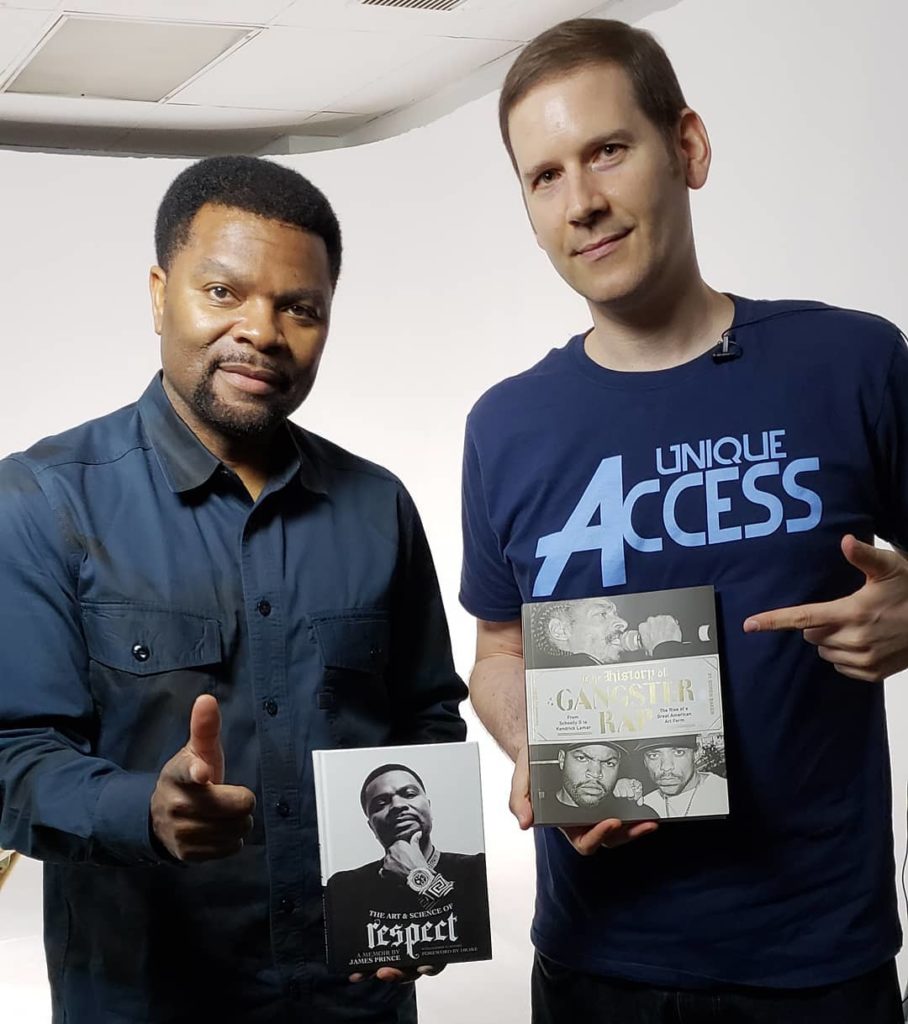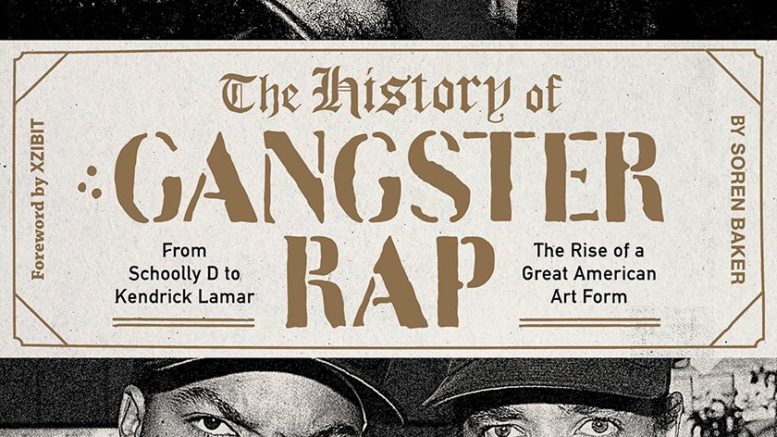The difficulties in writing a definitive history of anything includes being boring, and the author not knowing enough about the subject to be worthy of writing the history. Soren Baker has written several books and been present at several seminal moments in the history of gangsta rap. He has the credentials, along with the knowledge of who to speak to at every level of the genre’s history. Soren involved an impressive array of participants who discussed their roles in the events of the art form’s history.
When I read the book I was impressed by how he kept a sense of narrative despite relaying a series of in depth characters and details. His personal love of the subject shone through, making for a more enjoyable read. In fact, this is clearly an individual who has immersed himself in the subject from almost the beginning.
The History of Gangster Rap is a deep dive into one of the most fascinating subgenres of any music category to date. Sixteen detailed chapters, organized chronologically, examine the evolution of gangster rap, its main players, and the culture that created this revolutionary music. From still-swirling conspiracy theories about the murders of Biggie and Tupac to the release of the 2015 film Straight Outta Compton, the era of gangster rap is one that fascinates music junkies and remains at the forefront of pop culture. Filled with interviews with key players such as Snoop Dogg, Ice-T, and dozens more, as well as sidebars, breakout bios of notorious characters, lists, charts, and more, The History of Gangster Rap is the be-all-end-all book that contextualizes the importance of gangster rap as a cultural phenomenon. Purchase The History of Gangster Rap by Soren Baker here.

“Hip-hop changed the world. Gangster rap changed the narrative, and then changed the world again. Soren Baker has been a very integral part of documenting hip-hop on the West Coast for as long as I can remember. I don’t think anybody is more qualified to write this book.”
Xzibit
Soren Baker has written thousands of articles about music and culture for such outlets as the New York Times, the Los Angeles Times, and Rolling Stone, among others. He is currently producing a script he wrote for Snoop Dogg. Soren Baker has had more than 3,500 articles published in such publications as The New York Times, Los Angeles Times, Chicago Tribune, XXL, The Source and RedBullUSA.com. With Xzibit, Baker was the co-host of Open Bar Radio on 93.5 KDAY in Los Angeles.
Did you write your book because you thought that was a lack of a proper history?
That’s one of the reasons I wrote The History Of Gangster Rap. I wanted to make sure that people realized that Schoolly D, a rapper from Philadelphia, created gangster rap and that he directly influenced Ice-T and dozens of others. I think a lot of people think someone on the West Coast started gangster rap, but that isn’t the case. I also wanted to show how intelligent and influential gangster rappers and gangster rap have been.
When was the first time you were aware that you were listening to something called gangster rap?
It wasn’t until the early 1990s, most likely. I have a section of The History Of Gangster Rap where I talk about how a member of the media coined the name “gangster rap,” and I have MC Ren, DJ Quik, CJ Mac, Paris, and Cormega weigh in on what they think of the name “gangster rap.”
I was fascinated to find out that Master P didn’t care if people thought he was a rapper in regards to his craftsmanship and musical ability. Do you think he’s a rapper?
Yes, Master P is a rapper. He raps. What Master P was addressing was the inherent bias people, typically those in New York, who look down on rap and rappers that aren’t from New York. Master P knew he brought something to the table musically, so he was more focused on doing what he wanted to do with his music and his career than worrying about what a naysayer may or may not say about his skill level.
I think now the new trap rappers, they’ve convinced me they can get high. They’ve convinced me that maybe they can sell a little drugs. They don’t scare me. I think a gangster rapper has to scare you a little bit.
Ice-T
Were you surprised when Ice T said that trap rappers weren’t gangster because they didn’t “scare him?”
No. Ice-T comes from an era where rappers typically had to have at least some semblance of authenticity if they wanted to be considered hardcore. There’s a section of my book “The History Of Gangster Rap” where I explore this topic, as the parameters have evolved.
Do you think gang banging culture can be positive?
Yes. The gangbanging culture can provide brotherhood, direction and safety to some of its vulnerable members. In general and from what I’ve been told and seen, though, the life of a gangbanger is negative, and is typically defined by death, destruction, and despair.
Out of gangster rappers who do you think is the most underrated lyricist?
I think Ice-T is a gangster rapper who is an underrated lyricist. The stories he told, especially on his first five albums, are as good as any in the history of rap. Now Ice-T is more known and appreciated for his acting and as a pitchman, of course, but that doesn’t diminish his work as a rapper and lyricist. As I discuss in great detail in “The History Of Gangster Rap,” Ice-T brilliantly explored the highs of lows of a life of crime, particularly that of a gang member in the Los Angeles area. He deserves more credit for his lyrics.
What’s your favorite gangster rap album? Judge it by which one you’ve listened to the most and the first one that came to mind.
I don’t listen to albums in the same way that most people do, from what I’ve noticed, and I typically don’t listen to albums I like that much more than any other album in my collection. The best gangster rap album is Ice Cube’s “Death Certificate.” It’s an incredible look at life in the early 1990s in South Los Angeles, and how the gang-banging lifestyle affected the residents there and around the country.
In the early days of gangster rap, record company executives often didn’t understand it, how do you gauge their level of understanding today?
Today, I think record company executives
How would you respond to those who say Eminem and Kendrick Lamar aren’t gangster rap?
I don’t think Eminem is or should be considered a gangster rapper. He doesn’t rap about gang activity, isn’t from that environment, and doesn’t promote the lifestyle. Kendrick Lamar, on the other hand, could be considered a gangster rapper. Like Ice Cube, he grew up in a gang-infested area, and some of his music details the reality, fallout, and existence of gangbangers, and those who live with and around them. Also like Ice Cube, Kendrick Lamar doesn’t explicitly promote his gang affiliation, though if you pay attention to his clothes, his affiliations and such, it’s clear who is affiliated with.
How hard is it to get a book published? What’s the process entail?
Getting a book published through a publisher is difficult. The process is layered. You need a good, detailed outline, and/or you need to have the book complete when you get ready to shop the book. Then you need to get in touch with an editor at a publisher, either on your own, through a manager, or through an agent. From there, they have to read, review, and accept your proposal. Then you have to negotiate the terms of the deal, and then you get to work on the book. It’s a long, detailed process.
What advice would you give to someone who wants to become a hip-hop journalist and author?
I would suggest that they have a true love and a true passion for both writing and for hip-hop. They should read as much as possible in general and about rap in particular. They should also listen to as much rap as possible, from the old to the new.
Purchase The History of Gangster Rap by Soren Baker here.

Leave a comment